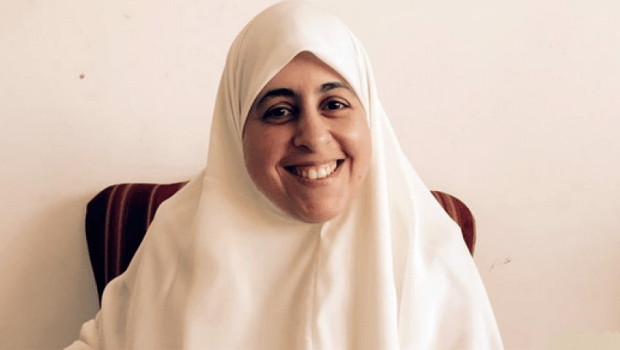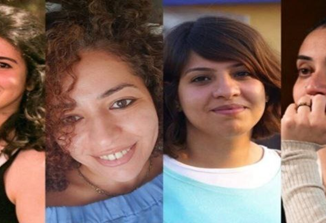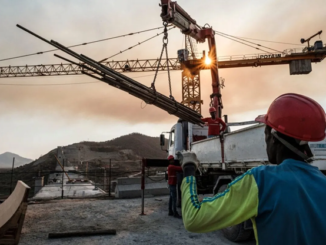
Aisha Khairat Al-Shater has been transferred to Al-Qanater Prison hospital after her health deteriorated in the one-meter square cell in which she is being held in solitary confinement.
The daughter of the deputy leader of the Muslim Brotherhood Khairat Al-Shater began an open hunger strike in mid-August in protest against her prison conditions.
The international rights organization “We Record” has documented the deterioration of her health inside the prison where she has been exposed to electric shocks, is forced to wear thin prison clothes despite the cold, is denied the ability to exercise and forced to sleep on the floor.
In June Aisha told an Egyptian court that she is using her pocket as a toilet since she is allowed out of her cell just once a day to use the bathroom. She has no access to a shower and is not being provided with sanitary products.
In violation of Egyptian law, Aisha has been banned from receiving visitors, including her children.
Aisha was arrested along with her husband, the lawyer and spokesperson for the Egyptian Coordination for Rights and Freedoms (ECRF) Mohamed Abu Huraira, in November 2018, forcibly disappeared and tortured inside the National Security Service in Abbasiya in Cairo.
That night a total of 19 human rights activists were arrested including 60-year-old human rights activist and lawyer Hoda Abdelmonem.
Since then Aisha has been accused of a raft of terror charges, yet We Record maintains that her detention is unfounded and comes within the context of the regime’s ongoing repression against women:
There are no legitimate penal reasons for such practices by the Egyptian authorities other than its desire to punish women prisoners and destroy their morale.
Ola Al-Qaradawi, daughter of Sheikh Yusuf Al-Qaradawi, also announced she would begin a hunger strike in July after being returned to solitary confinement despite a court order to release her.
Naglaa Mokhtar, co-founder of Eye Witness Human Rights Activists and International Law who helped women and children in need, was arrested from Cairo airport in September last year.
She told her husband that she has been raped by police with a wooden stick and beaten. She is also being held in solitary confinement and denied medical care.
We Record has stressed that “social isolation resulting from solitary confinement is considered a death penalty against the detainee as social isolation and the associated sensory deprivation negatively affect the detainee’s body.”
According to the organization 2,761 women have been tortured and degraded in various detention centers since the July 2013 coup.
Following is the text of the WE RECORD statement:
Not the Only One: Aisha Al-Shater, Hunger Strike for Life
The “We Record” team has documented the deteriorating health of the detainee, Aisha Mohamed Khairat Al-Shater, which required transferring her from the prison’s solitary confinement to Al-Qanater Prison hospital.
Ms. Aisha Al-Shater has been on an open hunger strike since August 19, 2019 in protest against the continuous violations she has been subjected to by the Egyptian authorities since her arrest, up to placing her in solitary confinement on a permanent basis. The Egyptian authorities arrested Ms. Aisha Al-Shater and her husband, lawyer Mohamed Abu Huraira, on November 1, 2018, where she was subjected to enforced disappearance and torture for 20 days inside the headquarters of the National Security Service in Abbasiya, Cairo. She appeared before the State Security Prosecution on November 21, 2018, on Case No. 1552 of 2018, where she faced charges of joining a terrorist organization founded in violation of the law, incitement to harm the national economy, receiving funds for the purpose of terrorism, and participating in a criminal agreement leading to commission of a crime – recurrent charges used by the Egyptian authorities against political opponents as well as human rights and civil society activists.
Ms. Al-Shater was subjected to a series of violations that have not been limited to the enforced disappearance and torture, particularly exposure to electric shocks, inside the headquarters of the National Security Service, but the prison administration also practiced a series of abuses against her since her arrival at the Qanater Prison, in violation of the the United Nations Standard Minimum Rules for the Treatment of Prisoners, including:
– Stripping her of clothes and personal belongings and forcing her to wear the thin prison clothes in the extremely cold winter climate.
– Placing her in a solitary cell with an area of only 1 meter x 1 meter, eighty centimeters; that does not allow the entrance of rays of the sun, in addition to lack of a toilet or ventilation.
– The National Security Service prevented the prison administration from providing a mattress for the detainee to sleep on inside her cell.
– Not allowing her to go to the toilet more than once a day.
– Depriving the detainee of her right to exercise.
– Denying her the right to visits, communication with her family or seeing her kids.
It is noteworthy that Ms. Aisha Al-Shater is not the only female detainee that suffers from the discipline of permanent solitary confinement inside Al-Qanater Prison, but there are also two female detainees who are also placed in the graves of solitary confinement, namely:
– Ms. Ola Yousef Al-Qaradawi, arrested on June 30, 2016 and accused within Case No. 316 of 2017 – Higher State Security Prosecution.
– Ms. Naglaa Mokhtar Younis Mohamed Azab, arrested on September 2, 2018 and accused within Case No. 1327 of 2018 – Higher State Security Prosecution.
The “We Record” team stresses that the social isolation resulting from solitary confinement is considered a death penalty against the detainee; as social isolation and associated sensory deprivation negatively affect the detainee’s body.
We affirm that there are no legitimate penal reasons for such practices by the Egyptian Authority other than its desire to punish women prisoners and destroy their morale in the context of the ongoing repression against Egyptian women.
Accordingly, the UN Working Group on Arbitrary Detention is expected to ask the Egyptian authorities to allow them to visit Ms. Aisha al-Shater, Ms. Ola al-Qaradawi and Ms. Naglaa Mokhtar in order to monitor the circumstances of their detention and the violations they have suffered.
Individuals and community-based organizations must also play an active role in tracking abuses and perpetrators and acquainting the community with them.
‘We Record’ Team
Cairo – September 5, 2019



